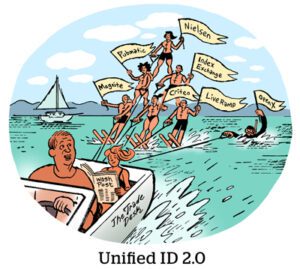Here’s today’s AdExchanger.com news round-up… Want it by email? Sign up here.
The End Of IP
Damn patent trolls to hell – but this is about a different kind of IP.
The walls are closing in on IP addresses as an identity signal, as browser makers and hardware manufacturers devise methods for passing the data they need without exposing IPs.
The new Pixel 7 phone, for example, carries a built-in VPN that masks IP addresses, and Google Analytics will no longer log or store IP address data starting in July 2023.
Hold the phone, though … Why does Google seem even more aggressive about stopping IP address data collection than Apple?
To be fair, Apple does have IP address blockers for people with iCloud and Apple Mail, but it hasn’t plugged software vulnerabilities or aggressively stopped IP address collectors.
The answer is that Google Analytics is now illegal in EU markets. Independent site owners that use GA and happen to be blissfully unaware of this drama aren’t going to jail or anything, but a handful of cases have already led to fines. More will come.
This is not a tenable situation for Google.
That’s also why the IP address deadline for next July is set in stone, whereas third-party cookie deadlines are written in chalk on wet pavement. (H/t @Aram Zucker-Scharff.)
Sharing Isn’t Caring
Speaking of Google Analytics, the US is in a hurry to resume transatlantic data sharing after the 2020 Schrems II decision did away with Privacy Shield.
On Friday, President Biden signed an executive order that gives European citizens new rights to challenge the US government’s “surveillance practices,” The Wall Street Journal reports.
The executive order follows talks between the US and EU about a shared data privacy framework, including a process for EU citizens to file complaints.
The European Commission still needs to approve the order, which could take six months – and approval is far from assured.
Earlier this year, French and Austrian data protection authorities prohibited websites from using Google Analytics because the service transmits data back to US servers. (This is another fix Google is changing when it shifts all customers to GA4 next July; see above.)
Complicating matters, the US Congress and President Trump previously passed a law explicitly giving the government data requisition rights for American companies storing data abroad.
Meanwhile, without an international data sharing standard, expect Google and Meta, as well as major American cloud tech players like Amazon and Microsoft, to get hit with privacy breach allegations.
Social Butterflies
Erika Kullberg, an attorney and founder of a company called Plug and Law that provides legal services to small businesses, has a fascinating peek inside creator earnings. Aside from the legal gig, she’s a professional poster.
In one year on TikTok, Kullberg amassed 452 million views and made a total of $3,255 in steady increments of a few bucks per day.
In three months on Facebook, she’s collected 3.3 million followers and received three payouts: $447, $895 and, most recently, $1,729 in September.
“The cool thing is the videos I post on Facebook are the same ones I already made for TikTok so there’s no extra work,” she says. (Owned.)
On Instagram, Kullberg has 263 million views and 4.1 million followers – but she makes $0 from it, because Instagram reserves its viral content payments to influencers below one million followers.
Buckle in for the YouTube numbers, though. Although Kullberg “only” has 753,000 YouTube subscribers, YouTube pays out differently by video type. A recent 29-second video with 1.8 million views earned just $3 while a 12-minute video with 2.3 million views paid out … drum roll … $35,000. Her two-year earnings on YouTube are just shy of $200,000.
But Wait, There’s More!
ESPN nears a major media and marketing partnership with DraftKings. [Bloomberg]
Will TikToks become the new music videos when it comes to product placement? [Marketing Brew]
The consent string drama continues: Belgium’s data regulator will move forward to examine the plan IAB Europe submitted in April (to try and prove that RTB is kosher) despite the Belgian Market Court’s more recent interim ruling in September declaring the data regulator’s original decision to be illegal. [release]
Bidstack raises $11 million for its US expansion. [release]
What the tug-of-war over Hulu might mean for Nielsen. [Insider]













